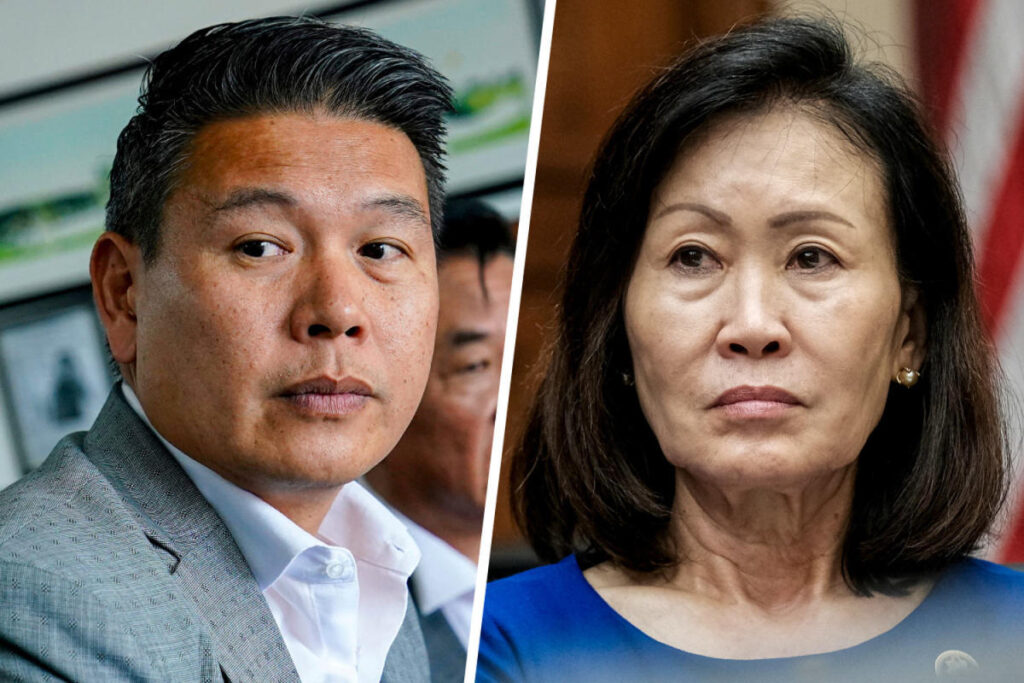Democrat Derek Tran recently emerged victorious against Republican incumbent Michelle Steel in the race for California’s 45th Congressional District, encompassing parts of Orange County and Los Angeles. This closely contested election, which concluded with a razor-thin margin of only a few hundred votes, marks a significant shift as Tran’s win flips the district’s representation from Republican to Democrat. Notably, this election was one of only two instances in which California districts shifted toward the Democratic Party in a state that has seen a broader move to the right. With a staggering amount of over $34 million spent in campaign financing as tracked by OpenSecrets, the election was marked by high stakes and intense competition, particularly among Asian American voters, who represent 39% of the district’s population.
Both candidates took care to appeal directly to Asian American voters throughout their campaigns, a strategic move considering their shared heritage within the community. Tran, a military veteran and consumer rights attorney, emphasized his Vietnamese background as a pivotal component of his identity and campaign narrative. At the same time, Steel, who has been a trailblazer as one of the first Korean American women elected to Congress, leaned heavily on her own immigrant story and her dedication to representing the needs of her constituents. Their ethnic identities played a significant role in defining the race as both candidates strove to connect with the Vietnamese electorate in particular, while trading barbs over who better represented the community. Steel went so far as to assert that she is “more Vietnamese than my opponent,” which Tran challenged as disrespectful and reductive of his family’s history and experiences.
The aggressive campaign efforts pivoted around not only their shared backgrounds but also a series of contentious anti-communist and anti-China messages aimed at winning over the Vietnamese community—composed largely of individuals with personal histories of fleeing communist regimes. Both Tran and Steel pledged strong stances against what they framed as the threat of “Chinese Communist rule.” Such messaging, however, resulted in a polarized electorate within the community, as candidates engaged in what some deemed “red-baiting,” casting each other as sympathetic to communist ideologies. This rhetoric was criticized by observers who felt it detracted from substantive discussions of the candidates’ positions on important issues. Veteran Orange County teacher Don Luong expressed frustration with the emotional manipulation inherent in red-baiting tactics, underscoring a desire for a more focused dialogue on policies that matter.
The campaign witnessed an escalation in mutual accusations, with both candidates utilizing mailers and advertisements to link each other to China and socialism. Steel’s campaign attempted to paint Tran as a socialist threat, while Tran responded to such attacks by labeling Steel’s messaging as “xenophobic.” This trend highlights a broader concern within the electorate regarding the use of aggressive rhetoric as a tool for political gain, emphasizing a growing impatience among younger voters who dissect these tactics as out-of-touch, primarily stemming from older generations’ traumatic experiences with communism.
Amid the animosity, leaders from various community organizations urged both candidates to avoid harmful rhetoric that could stigmatize political candidates of Asian descent. In an open letter, they called attention to the need for constructive discourse and warned against scapegoating based on racial prejudices. They highlighted that such tactics could have severe repercussions, urging a narrative that steered away from fear-mongering, instead insisting on a focus on solutions and addressing the pressing issues facing constituents. There is a growing acknowledgement among voters, especially younger voters, that these inflammatory tactics could alienate them from meaningful political engagement.
Tran’s victory represents a notable leftward shift in a district that has, in recent years, fluctuated between red and blue political representation. It contrasts sharply with a broader trend observed in California elections this season, where voters displayed support for more conservative crime policies, including the ousting of local progressive leaders. Other election outcomes illustrate that even in predominantly Democratic California, there is a significant undercurrent of desire for more conservative governance, particularly in matters of public safety and social policies. The electorate’s dissatisfaction in areas such as crime prevention and community safety has led to pivotal choices at various levels.
As the political landscape continues to evolve, Tran’s success may signal new dynamics within the Asian American voting bloc and broader Californian electorate, especially as candidates are compelled to adapt their strategies. With the influx of younger, politically active voters, it becomes crucial for aspiring officials to move beyond divisive rhetoric and engage with constituents on substantive issues that resonate with their experiences and aspirations. Tran’s victory, along with Steel’s concessions, suggests that the days of traditional campaigning strategies reliant on identity politics and fear-based messaging are on borrowed time, ushering in a possibility for a new era of representation rooted in empathy, practicality, and community building.

